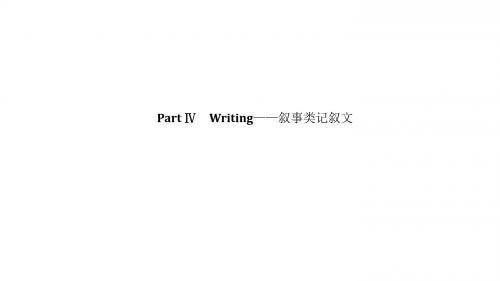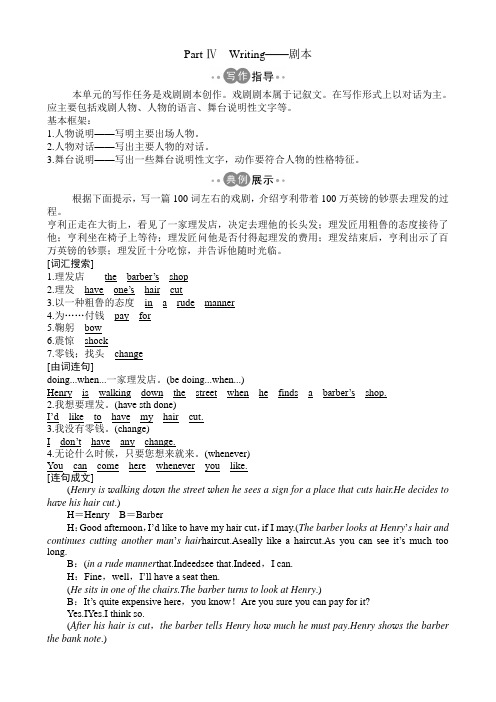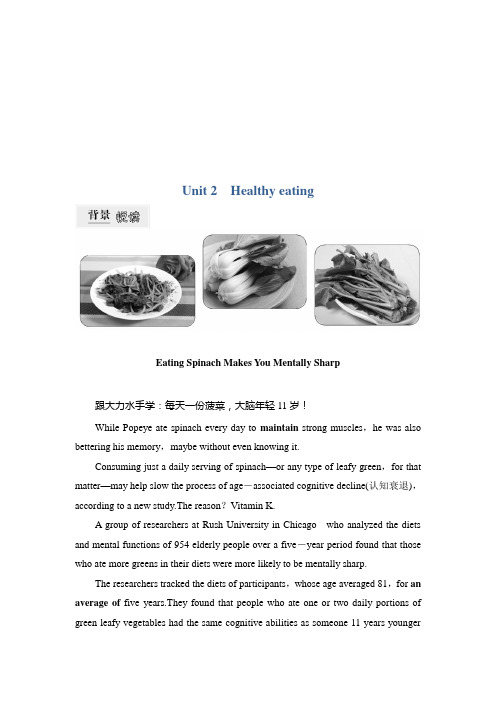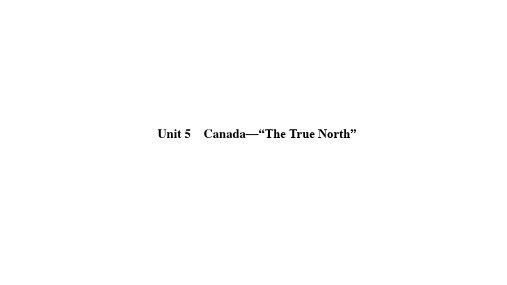2018-2019学年新课堂高中英语(人教课改地区专用版)必修三讲义:Unit 2 Part ⅡWord版含答案
- 格式:doc
- 大小:143.50 KB
- 文档页数:5



Unit 2Healthy eatingEating Spinach Makes You Mentally Sharp跟大力水手学:每天一份菠菜,大脑年轻11岁!While Popeye ate spinach every day to maintain strong muscles,he was also bettering his memory,maybe without even knowing it.Consuming just a daily serving of spinach—or any type of leafy green,for that matter—may help slow the process of age-associated cognitive decline(认知衰退),according to a new study.The reason?Vitamin K.A group of researchers at Rush University in Chicago who analyzed the diets and mental functions of 954 elderly people over a five-year period found that those who ate more greens in their diets were more likely to be mentally sharp.The researchers tracked the diets of participants,whose age averaged 81,for an average of five years.They found that people who ate one or two daily portions of green leafy vegetables had the same cognitive abilities as someone 11 years youngerwho never consumed leafy greens.“No other studies have looked at vitamin K in relation to change in cognitive abilities over time,and only a limited number of studies have found some association with lutein(叶黄素),”said Martha Clare Morris,Sc.D.,assistant provost for community research at Rush University Medical Center and the leader of the study’s research team.The team beli eves that other foods high in these nutrients,like asparagus (芦笋) and carrots,could provide the same benefits as the darker greens,and they intend to expand their research to explore this possibility.The research holds promise of a brain booster that is accessible and affordable.“Since declining cognitive ability is central to Alzheimer’s disease and dementia,increasing consumption of green leafy vegetables could offer a very simple,affordable and non-invasive(非侵入的) way of potentially protecting your brain from Alzheimer’s disease and dementia,”Morris said.词海拾贝1.maintain /meIn'teIn/ v t.保持;保养2.an average of 平均;平均有3.a limited number of 少量的;少数的4.intend /In'tend/ v t. 意欲;打算5.accessible /ək'sesIb(ə)l/ adj. 易接近的;易得到的Part ⅠWarming Up & ReadingⅠ.重点单词1.diet n.日常饮食v i.节食2.ought v.aux.应当;应该3.slim v i.变细;减肥adj.苗条的;纤细的4.raw adj.生的;未加工的5.lie n.谎话;谎言v i.说谎;躺;位于6.customer n.顾客;消费者7.discount n.折扣8.balance v t.平衡;权衡n.天平;平衡→balanced adj.平衡的9.fry v t.& v i.油煎;油炸→fried adj.油炸的10.curiosity n.好奇心→curious adj.好奇的11.hostess n.女主人;女主持人→host n.主人;主持人v.主持;主办12.weakness n.虚弱;缺点;弱点→weak adj.虚弱的13.strength n.强项;长处;力量→strong adj.强壮的Ⅱ.核心短语1.lose__weight体重减轻;减肥2.get__away__with 被放过;(做坏事)不受惩罚3.win...back 赢回;重新获得4.tell__lies/a__lie 说谎5.keep__fit/healthy 保持身体健康6.do some research 做些研究7.be tired of 对……厌烦8.be amazed at 对……感到惊讶Ⅲ.经典句式1.Wang Peng sat in his empty restaurant feeling__very__frustrated.王鹏坐在他那空荡荡的餐馆里,感到很沮丧。

Part ⅢLearning about Language & Using LanguageⅠ.重点单词1.confirm v t.证实;证明;批准2.schoolmate n.同学;校友3.dawn n.黎明;拂晓;破晓4.broad adj.宽阔的;广泛的5.tradition n.传统;风俗→traditional adj.传统上的6.mix v t.& v i.混合;调配→mixture n.混合(物);混合状态7.wealthy adj.富有的→wealth n.财富;财产8.distance n.距离;远方→distant adj.远方的9.approximately ad v.接近;大约→approximate adj.近似的;大约的10.nearby ad v.在附近adj.附近的;邻近的→near prep.在……的附近adj.附近的;邻近的11.terrify v t.使恐怖;恐吓→terrified adj.恐惧的;受惊吓的→terrifying adj.令人恐惧的12.pleased adj.欣喜的;高兴的;愉快的→pleasant adj.令人高兴的→pleasure n.高兴(的事)13.impress v t.使……印象深刻;使……铭记→impressive adj.给人深刻印象的;感人的→impression n.印象Ⅱ.核心短语1.mix__up使迷惑;弄错;弄乱2.go__on__a__tour 去游览3.in__the__distance 在远处4.as__far__as 远到;远达;直到;就……而言5.at dawn 在黎明6.go downtown 去市区7.look over 眺望;检查8.dream about/of 梦想Ⅲ.经典句式1.They were__not__leaving__for__Montreal__until__later,so they went on a tour of the city.她们要晚些时候才动身去蒙特利尔,因此就在(多伦多)市内游览了一番。

教学过程一、课堂导入以提问的形式,提问学生对马克·吐温和他的作品的了解,并做简单的介绍。
二、复习预习教师引导学生复习上节课所学知识点,(以提问、回顾的形式进行),针对上节课的作业进行讲评、订正、答疑,并通过对宾语从句具体用法的分析和扩展导入本节课所要学习的课本知识的学习。
三、知识讲解考点/易错点1 重点单词与短语学习bring up培养;抚养;养育或教育某人;提出(回归课本P17)He was brought up in Hannibal.Eg: She brought up five children. 她养育了五个孩子。
Her parents died when she was a baby and she was brought up by her aunt. [归纳拓展]bring sb. up to be/as 培养某人成为bring sb. up to do sth. 培养某人要……bring about 带来,造成;使(船等)掉过头来bring back 带回来,拿回来;使回忆起来;使恢复bring down降低,使下降,使倒下bring in 收割(庄稼等);生产,产出;挣得;引进/来bring out 出版,生产;拿出,取出;说出;使显出,使(意义)明白表达出来bring……to a close/ an end结束,使完结bring……to a stop使停止,使停住scene n. 场面;情景;景象;事件(回归课本P17) Act 1 ,scene 3.[归纳拓展]辨析:scene / sight / view / sceneryscene 指某一处的自然风光,指展现在眼前的情景,也可指scenery的一部分;指某处小范围的景色,大多包括景物中的人及活动,可译为“情景”、“景色”、“场面”、“(戏剧)一场”。
scenery(总称)自然景物,天然风光,是由多个scenes构成的自然风景。

Part ⅡGrammar——名词性从句[思维导图]一、名词性从句1.概念:在主从复合句中,相当于名词的从句被称为名词性从句。
2.分类:名词性从句包括:主语从句、宾语从句、表语从句和同位语从句。
3.连接词4.注意事项(1)名词性从句要用陈述语序;(2)主从句的时态要基本呼应,有时需用虚拟语气; (3)注意某些连接词的特殊用法(见后)。
二、宾语从句1.分类:在复合句中作动词或介词宾语的从句叫作宾语从句。
(1)that 引导的宾语从句用法⎩⎪⎪⎨⎪⎪⎧①无意义 ②不充当成分省略情况⎩⎪⎨⎪⎧省略⎩⎨⎧①作动词或形容词的宾语②有两个that 引导的宾语从句时,前一个从句中的that 可以省略不省略⎩⎨⎧①介词后宾语从句引导词that ②有两个that 引导的宾语从句时, 后一从句中的that 不省略I believe (that) you have done your best and that everything will go well. 我相信你已经尽力了,而且一切都会好起来的。
He said (that ) you were too young to understand the matter and that you were asked not to care about it.他说你太年轻,还无法理解这件事情,你也不要去管它。
[名师点津] that 引导的宾语从句有时可作间接宾语。
She told me that she would accept my invitation. 她对我说她会接受我的邀请。
(2)whether 或if 引导的宾语从句whether 或if 引导宾语从句时,在句中不充当成分,但是含“是否”之意,从句要用陈述语序。
I wonder whether /if we’ll finish the task on time. 我不知道我们能否按时完成这项任务。
Part ⅣWriting——叙事类记叙文本单元的写作任务是写一篇叙事类记叙文。
该类作文以叙述事件为主,要通过完整的故事情节和生动形象的语言,使读者在享受故事情节的同时有所感悟。
写作时要注意把记叙文的六要素:时间、地点、人物、事件、原因和结果等交代清楚。
一、基本结构1.开头——交代清楚事件的背景。
2.主体——主要叙述事件的发生、经过及结果。
3.结尾——呼应标题,发表感想、愿望等。
二、注意事项1.标题:如有标题,标题一定要明确,能点明事件或主题。
2.人称:通常用第一人称和第三人称。
3.时态:在叙事过程中,一般用过去时态。
在描写背景或某景象时,常用过去进行时,这样显得更加生动形象。
下面六幅画讲述的是出租车司机小张在2018年3月的一个早上一次出车送一对美国夫妇去宾馆的过程中所遇到的一件事。
请按图示写一篇80词左右的短文。
参考词汇:一对夫妇a couple 接待员receptionist 护照passport[词汇搜索]1.送某人去某地drive__sb__to__sp2.下车get__off3.挥手道别wave__goodbye4.把某物还给某人return__sth__to__sb5.感激的adj. thankful6.表扬某人praise__sb[由词连句]1.当他们到那里时,这对夫妻下了车,付完钱然后挥手道别。
(状语从句;并列谓语动词)When__they__got__there,the__couple__got__off__the__taxi,paid__the__driver__and__waved__goodbye.2.他打开包,发现里面有一些美元和一张护照在里面。
(现在分词作状语)He__opened__the__bag,finding__some__US__dollars__and__a__passport__in__it.3.他认为肯定是这对夫妻把它落在这儿的。
(must;定语从句)He__thought__it__must__be__the__couple__who__had__left__it__there.4.这对夫妻非常感激并且表扬了他的诚实。
Part ⅡGrammar——情态动词(Ⅱ)
[思维导图]
一、ought to的用法
(1)表示责任和义务,意为“应该”,与should同义,但语气比should重,侧重于“责任、义务、道德、法律”等方面。
To be a popular student,we ought to be strict with ourselves.
为了成为一名受欢迎的学生,我们应该对自己要求更加严格。
[名师点津]ought to的否定形式为ought not to(oughtn’t to);一般疑问句形式是将ought提至句首,其否定答语通常用don’t have to或needn’t。
—Ought he to see the doctor?
——他该去看医生吗?
—Yes,he ought to./No,he doesn’t have to.
——是的,他该去。
/不,他不必去。
You ought not to make this kind of mistake again.
你不应该再犯这种错误了。
(2)表示可能性,一般指较大的可能性,意为“按道理应该”。
If he started at six,he ought to be here now.
要是他6点就出发的话,这会儿该到这里了。
二、need的用法
1.作情态动词
(1)need作情态动词时,常用于疑问句、否定句或条件句中,意为“需要”。
—Need I finish the work today?
—Yes,you must./No,you needn’t.
——我需要今天干完这活吗?
——是的,必须干完。
/不用,你不必干完。
(2)needn’t 意为“不必”,表示客观上不必如此。
There’s plenty of time.You n eedn’t drive so fast.
时间很充足,你不必开这么快。
2.作实义动词
need作实义动词时,后可接名词、动名词、不定式等,有人称、时态和数的变化。
The bike needs repairing.
=The bike needs to be repaired.
这辆自行车需要修理。
三、have to
(1)have to表示客观上的必要性,意为“不得不”。
由于它是由“have+to”构成,因此它有多种时态变化形式以及人称和数的变化,其疑问句式和否定句式由助动词do构成。
It’s t oo late.I have to go home now.
天色太晚了,我现在得回家了。
Did you have to leave now?你现在必须得走吗?
We don’t have to go to school on Sundays.
星期天我们用不着上学。
(2)have to的否定式don’t have to,表示没有义务或没有必要做某事,意为“不必”,常可以回答以must开头的疑问句。
而must的否定式mustn’t表示“禁止,不许”。
You don’t have to finish the work now.
你现在没有必要完成这项工作。
—Must we hand in our homework this afternoon?
——我们必须今天下午交家庭作业吗?
—No,you don’t have to/you needn’t.
——不,你们不必。
(肯定回答为:Yes,you must.)
(3)have to表示客观需要,而must则表示主观的看法。
You must obey the rules of your school.
你必须遵守学校的规章制度。
I have to go now because it’s getting dark.
天快黑了,我必须得走了。
四、情态动词+have done
“情态动词+have done”表示对过去事情的推测。
各情态动词的这种具体用法如下表:
From what you said,she must have told you all about it.
从你所说的来看,她一定把一切都告诉你了。
You should have told me earlier or I might have gone with them.
你应该早点告诉我,不然的话我就会和他们一块去了。
They could have sent up the satellite successfully.
他们本来可以成功发射这颗卫星的。
You ought to/should have been more careful.
你本应该更小心一些的。
You needn’t have told them about it.
你本来没有必要告诉他们那件事。
Ⅰ.选词填空
1.You mustn’t go there alone;it’s too dangerous.(mustn’t/needn’t)
2.The park is so beautiful,so we shouldn’t throw away rubbish everywhere. (shouldn’t/can’t)
3.You oughtn’t__to have spent so much time playing computer games.
(mustn’t/oughtn’t to)
4.—Shall I leave the room so that you two can talk?
—No,you needn’t.(mustn’t/needn’t)
5.They ought__to win for they’ve trained hard enough.(ought to/must)
6.They had__to stay in the office last night because of the snowstorm.(have to/must)
7.—Must I finish my work today?
—No,you needn’t.(need/must)
8.As an athlete,he has__to know his strengths and weaknesses.(have to/need)
9.He finished all the work himself;in fact,he could have asked his friends for help.(need/could)
10.Something bad must have happened if Mr.Brown didn’t turn up on time to have class as he always did.(have to/must)
Ⅱ.补全句子
1.I have just found that I__had__to__attend__an__important__class__meeting (我必须参加一个重要的班会) that afternoon.
2.George can’t__have__gone__too__far(不可能走太远).His coffee is still warm.
3.I love the weekend,because I needn’t__get__up__early(不必早起) on Saturdays and Sundays.
4.The length of the article should__be__limited__to__400__words__or__so (应当限制在400词左右).
5.The last important thing you__should__remember (你应当记住的) is that you have to send the article to me before June 28.
6.I badly need__someone__to__help__me__with__my__oral__English (需要有人来帮助我学英语口语),at which lots of Chinese students are bad.
7.You needn’t__have__referred__to__it (本不必提起它),for I had known about it.
8.You must__have__seen (肯定看过) the film The Pursuit of Happiness.
9.Mr.Smith can’t__have__gone__to__Beijing (不可能去北京了),for I saw him in the library just now.
10.You oughtn’t__to/shouldn’t__have__written (本不应该写) so fast.。